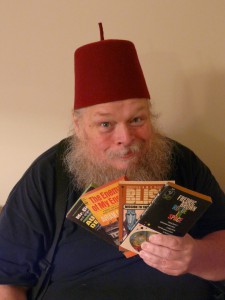 When an author stops breathing, the stories stop coming, but the presses keep rolling. Ah, but do the checks keeping coming? Enter: Bud Webster of the SFWA’s Estate Project.
When an author stops breathing, the stories stop coming, but the presses keep rolling. Ah, but do the checks keeping coming? Enter: Bud Webster of the SFWA’s Estate Project.
CARL SLAUGHTER: Why does the SFWA operate an estate project? How does liaisoning for deceased authors help SFWA members?
BUD WEBSTER: Well, with the advent of e-publishing both online and through Kindle/Nook readers, more and more of the classic sf/fantasy stories and novels are in demand. The Estates Project was created primarily to enable both paper and electronic publishers to approach heirs and/or agents in order to seek permission, sign contracts and make royalty payments. How does that help current members? Well, the glib answer is that eventually they’ll ALL be estates, but aside from that it adds to the list of services SFWA as an organization offers. The more we do to protect authors’ rights, whether those authors are above or below the ground, the better off our members are. Of course, the Project extends to non-members as well, as it should; SFWA advocates for ALL sf/fantasy writers, not just the ones who pay dues every year.
CARL: How does the estate project help publishers, editors, agents, and anthologists?
BUD: Publishers come to us looking for contacts with an estate. In many cases, the estate is handled not by an agent but by a family member or other heir. Using the database (over 500 names at this point), we hook the two sides up so they can do business. Some are looking to reprint stories, others want to publish novels. In a few cases, a publisher would like to make a writer’s entire body of work available, and this makes it possible for them to do so legitimately and legally, with benefit to them, the heirs and the readers. Agents are more willing to represent estates if they know that there is a resource for editors and anthologists to use to find them.
CARL: What constitutes due diligence when determining whether a story is public domain?
BUD: A good question, but one that doesn’t have a simple answer. You can’t just Google a name, not find anything on the first screen, and assume that the estate is dead. Nor can you find one source offering the work for free and claiming it’s PD and not look further. That ain’t no way diligence, due or otherwise. For me, due diligence is looking for as long as it takes to find an answer one way or another. If that means asking a few people, fine. If it means checking the Copyright Office website for specific renewal notices, searching for the possibility that the magazine that originally published a story may not have registered copyright then looking further to see if the author did at a later time, then that’s equally fine. I will point out here, though, that to my direct knowledge the information at the CO website is not always accurate; in one specific case, an e-publisher checked the status of a novel there, found no notice of renewal, and issued the book. When the author – still alive and writing, I’ll point out – found out about it, he was able to show the publisher his paperwork proving that the rights HAD been renewed. To the publisher’s credit, they immediately issued a check in the amount the writer asked for. So, due diligence? It’s whatever it takes. Now I know that’s not terribly responsive, and it’s certainly NOT a legal definition by any means, but it’s what I do.
CARL: How does the current copyright law place authors and estates at a disadvantage?
BUD: Hard for me to say, as I’m not a lawyer. I consider myself a copyright conservative – I think publishers should always err on the side of the estate – but I do consider the current term of copyright (life of the author plus 70 years) to be unreasonable. It is the law, however, and that’s what we have to deal with, not what we think it should be. I don’t think it places either authors or estates at a disadvantage, though. Again, I’m not a lawyer. The most important thing that the law does, in my distinctly un-humble opinion, is to give the authors or their estates control over what is done with their work. This is more vital than you may think, as there are cases in which copyright has been blatantly violated. A couple of years ago, for example, a photo of two gay men kissing was used, without their or the photographer’s knowledge or permission, in a campaign against a Colorado politician who had advocated gay marriage. The Southern Poverty Law Center brought suit, but it was a split decision. To me, it was clear-cut – no permission, no rights. Until and unless I declare work of mine to be PD, I am the ONLY one who gets to say where, when or if that work is reprinted either in paper or phosphors. Or even mind-control rays from Venus.
CARL: Do you provide legal consultation on the copyright status, get involved in dispute resolution between estates and publishers, get involved in the prosecution of copyright violation, or post notice of violations?
BUD: Indirectly, yes, but as I said above, no lawyer be I. I can alert an estate to possible piracy (and do), suggest that they talk to a lawyer and perhaps aim them at one of the legal eagles in SFWA, and I do post URLs of pirate sites for other writers to use to look for possible pirate editions of their own work, but I cannot and do not act as a legal advisor. SFWA itself, in the forms of the Grievance Committee and Writers, Beware does act for the membership and has been very successful in doing so.
CARL: What about relatives who don’t want their names listed on the SFWA website?
BUD: We don’t list the names of ANY private individuals on the website unless they specifically ask to be listed. That way lies potential madness. Estates handled by family or other heirs are listed on the Estates Project page with a link to my official e-mail address. When I get a query, I either forward it to the family or blind-copy them when I reply to the inquirer. That way they can respond directly in their own time.
CARL: The publisher’s office, the agent’s office, the copyright office, the Internet, how hard can it be to get information about an estate?
BUD: Ah, there’s the rub. The problem isn’t finding information, it’s finding valid, accurate and current information. That’s tougher than you might think. You have to look deep, find more than one source, and verify verify verify. Anything less isn’t due diligence.
CARL: The estate liaison office lists contact information for more than 500 authors and is seeking contact information for an addition 65 authors. Finding and updating information for so many authors must require a huge staff.
BUD: Don’t I wish? Nope, it’s just me right now, and my faithful team of mutants, avengers and super friends. Seriously, I can put out a question to several hundred other people on the listserves I’m on, add to that the occasional notice in LOCUS and other info and news-oriented periodicals in the field and eventually find an answer – most of the time. Those estates I haven’t been able to find in the seven years or so I’ve been doing this are, very likely, orphaned; until I know for certain, though, they remain unknowns.
CARL: These names must be very familiar to you because you’ve written extensively on the history of science fiction. Tell us a little about that. Or better still, tell us a lot about that.
BUD: Funny you should ask….One of the reasons I was tapped for this task is my deep interest in and knowledge of classic sf and fantasy writers. It’s my geek, if you will. I started out writing in my own fanzine, Log of the Starship Aniara (later just Aniara), then gradually began writing for other markets beginning with a sercon (read: serious content) ‘zine called bare*bones in 2001, then moving on to paying markets like David Hartwell’s New York Review of Science Fiction and Science Fiction Chronicle a few years later. Those were all articles on sf and fantasy anthologies, an itinerant column I called “Anthopology 101.” In 2008, William Sanders and a few others of us started an onliner called Helix SF, and that’s where I began the “Past Masters” series. We did Helix for ten issues, then stopped; the column continued in Jim Baen’s Universe and when that died, went to Eric Flint’s Grantville Gazette. Both columns have been collected and are available in print from Merry Blacksmith Press. In addition, the Anthopology 101 collection is available in e-book format from ReAnimus Press.
There ain’t a lot of money in this (although I certainly won’t object if anyone reading this, like, buys a copy or two), but there has been an enormous amount of satisfaction and gratification over the past 13 or so years, not to mention the extreme pleasure of interviewing people like Jack Williamson, Phil Klass (william Tenn), Robert Silverberg, Harlan Ellison and Barry Malzberg. The passion I feel when I delve into our shared history, the sheer wonder I experience in digging into Yesterday’s stories of Tomorrow is overwhelming; like a solar flare straight from the heart of the Sun, it brightens my life and fires my intellect. I like to think that I have been able to impart some of that to my readers; and in my work with the SFWA Estates Project, I hope to repay those old masters for the Wonder they have given me over the decades.
 Carl Slaughter is a man of the world. For the last decade, he has traveled the globe as an ESL teacher in 17 countries on 3 continents, collecting souvenir paintings from China, Korea, Thailand, Vietnam, and Egypt, as well as dresses from Egypt, and masks from Kenya, along the way. He spends a ridiculous amount of time and an alarming amount of money in bookstores. He has a large ESL book review website, an exhaustive FAQ about teaching English in China, and a collection of 75 English language newspapers from 15 countries.
Carl Slaughter is a man of the world. For the last decade, he has traveled the globe as an ESL teacher in 17 countries on 3 continents, collecting souvenir paintings from China, Korea, Thailand, Vietnam, and Egypt, as well as dresses from Egypt, and masks from Kenya, along the way. He spends a ridiculous amount of time and an alarming amount of money in bookstores. He has a large ESL book review website, an exhaustive FAQ about teaching English in China, and a collection of 75 English language newspapers from 15 countries.

